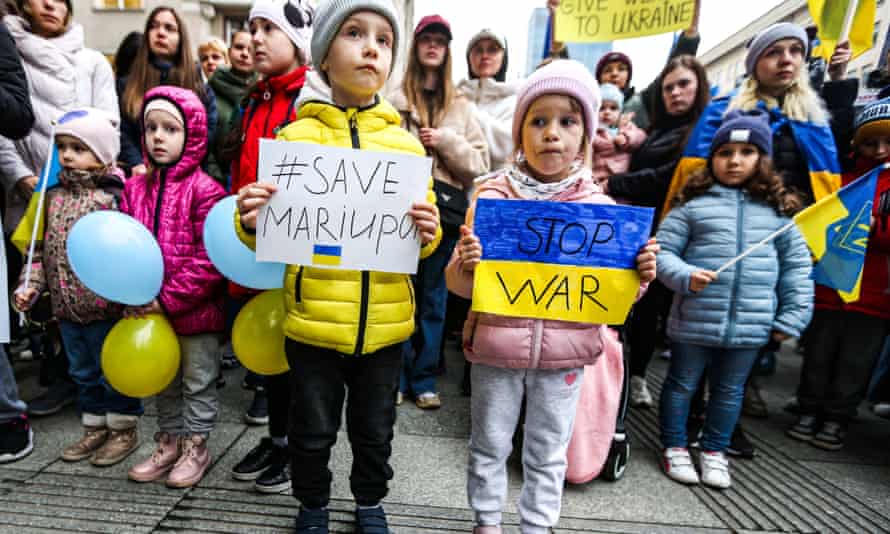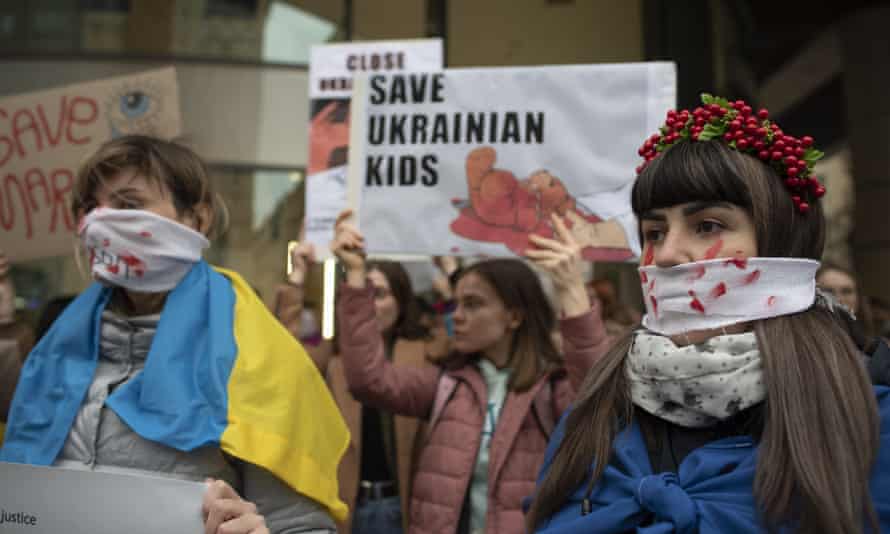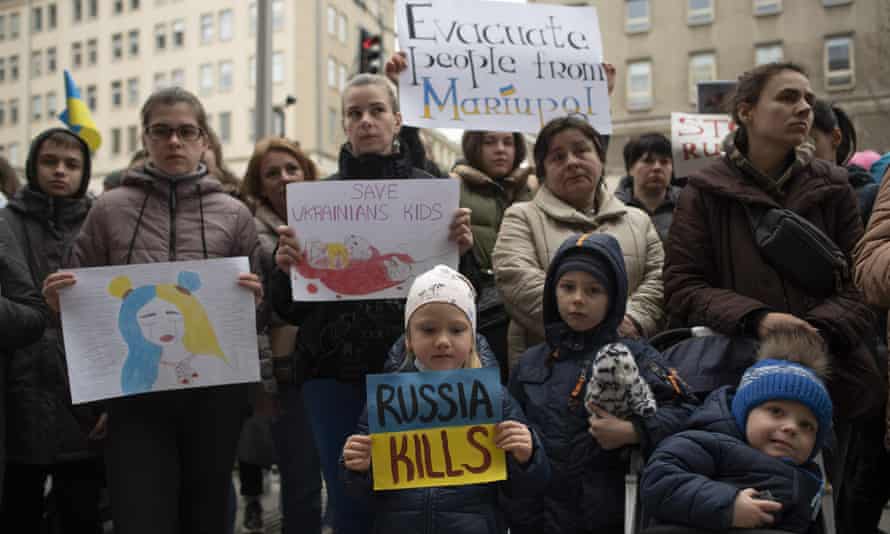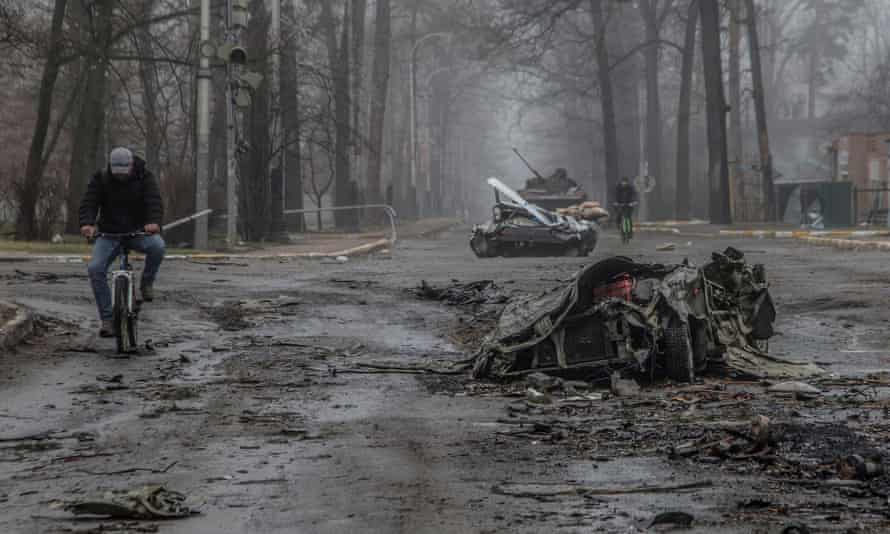Zelenskiy: 120,000 civilians blocked from leaving Mariupol
Around 120,000 civilians are blocked from leaving the besieged city of Mariupol, according to the Ukrainian president, Volodymyr Zelenskiy.
Responding to remarks by the Russian defence minister, Sergei Shoigu, that Russian forces control most of Mariupol, Zelenskiy said that Russia controls most of the port city, but that Ukrainian troops remain in a part of it.
Mariupol’s mayor, Vadym Boichenko, said around 200 people were still awaiting evacuation from the city but no buses had arrived as of mid-afternoon today.
A small convoy of buses had evacuated people from Mariupol on Wednesday and was now headed for the city of Zaporhizhia, he said.
He said it is impossible to confirm exactly how many civilians are still inside the Azovstal steel plant, and that it is unlikely there will be evacuations from the site today.
Senior Ukrainian official says troops face ‘a very difficult battle’
A top Ukrainian defense official said the country’s military is looking at a challenging conflict against larger and better equipped Russian troops, Reuters reported.
Hanna Malyar, the deputy defense minister, had advised the country to be patient, warning that it takes time to buy and arrange for the delivery of weapons.
Volodymyr Zelenskiy has pleaded for allies to send more weapons and impose further economic sanctions on Russia as the country continues its battle to take Ukraine. The president said Ukraine needed $7bn a month to help combat economic losses brought by the invasion.
“This is just the first step (for Russia) to gain control of eastern Europe, to destroy democracy in Ukraine,” he told the Portuguese parliament. “We are fighting not only for our independence, but for our survival, for our people, so that they do not get killed, tortured and raped.”
I’m Dani Anguiano, and I’ll be bringing you the latest developments in Ukraine over the next few hours.
Julian Borger
Here’s the Guardian’s Julian Borger with more details of the new US aid package to Ukraine:
Joe Biden has announced $800m (£613m) in new arms supplies to Ukraine and said he will go to Congress to ask for more funding to help fend off the renewed Russian offensive in the east and south.
The new US weapon deliveries will include 72 howitzers and their towing vehicles along with 144,000 artillery rounds and more than 120 drones tailored for Ukraine’s needs.
“We’re in a critical window of time when [the Russians] are going to set the stage for the next phase of this war,” Biden said. “And the United States and our allies and partners are moving as fast as possible to continue to provide Ukraine the weapons their forces need to defend their nation.”
Fifty Ukrainian artillery officers are being given a week-long course by US instructors on the use of US 155mm howitzers in an unnamed European country, the Pentagon said.
Biden said the latest arms supplies with the emphasis on heavy artillery reflected the requirements of the different landscape of the Donbas, which is largely flat agricultural land, compared with the forests around Kyiv, providing fewer opportunities for ambushes and guerrilla warfare.
The president said the US had so far given Ukraine 10 anti-tank missiles, including Javelins, for every tank Russia has on the battlefield, along with armored cars, armed drones and other heavy equipment, and was playing the role of facilitator for arms deliveries from other countries.
“We won’t always be able to advertise everything that our partners are doing to support Ukraine in its fight for freedom,” Biden said, and he paraphrased a famous quote of Theodore Roosevelt: “Sometimes we will speak softly and carry a large Javelin.”
Read more:
Russian forces captured dozens of villages in the eastern Donetsk region on Thursday, an aide to Ukraine president Volodymyr Zelenskiy’s chief of staff said, according to Reuters.
Olena Symonenko told viewers on Ukraine TV:
Today 42 villages were added to the list of those that have been occupied. This is at the expense of the Donetsk region.
This happened today and [it] might be that our forces will win them back tomorrow.
Putin’s claim to have ‘liberated’ Mariupol is disinformation, US says
Officials in the US have dismissed as “disinformation” the claim by Russian president Vladimir Putin that his forces have “liberated” the port city of Mariupol, Reuters reports.
At a news briefing Thursday afternoon, Ned Price, spokesperson for the department of state, said:
We understand that Ukraine’s forces continue to hold their ground and there is every reason to believe that President Putin and his defense minister’s show for the media that we saw in recent hours is even yet more disinformation from their well-worn playbook.
Putin made the claim despite an admission by his defense minister that Russia’s military was still battling thousands of Ukrainian troops holed up in Azovstal steelworks.
Even so, the situation is “close to catastrophe”, according to Yuriy Ryzhenkov, chief executive of Metinvest Holding that owns the steelworks.
“When the war started we had stocked quite a good stocks of food and water in the bomb shelters and the facilities at the plant so for some period of time the civilians, they were able to use it and basically survive on that,” he told CNN.
“Unfortunately all the things, they tend to run out, especially the food and daily necessities. I think now it’s close to a catastrophe there.”
Read more:
Protesters gathered outside the European Parliament in Warsaw, Poland, on Thursday to mark the 57th day of Russia’s war in Ukraine and light candles for the 205 children recorded as killed so far.
Here are some of the images:

Several hundred people gathered to highlight the deaths of children in the Ukraine conflict:

Many families turned up to get their voices heard:


Sean Ingle
Wimbledon has been warned it could face legal action from the Belarusian Tennis Federation after it accused the All England Club of acting illegally by banning Russian and Belarusian players from this summer’s championships.
The BTF said it was consulting international law firms to “protect” its stars, including the two-time grand slam champion Victoria Azarenka and the world No 4, Aryna Sabalenka, as it condemned Wimbledon for inciting hatred with its decision.
“The Belarusian Tennis Federation categorically condemns the decision taken by the organisers of Wimbledon to suspend Belarusian and Russian tennis players,” it said. “Such destructive actions in no way contribute to the resolution of conflicts, but only incite hatred and intolerance on a national basis.
“Throughout the history of tennis, armed conflicts have occurred in the world – in Iran, Afghanistan, Syria, Yugoslavia and other countries – but never until now have tournament organisers suspended athletes from the United States, Great Britain and other countries,” it added.
It is understood that Wimbledon took legal advice before making its decision, which will significantly alter the makeup of the tournament given 17 of the Top 100 in the men’s and women’s rankings, including the world No 2, Daniil Medvedev, are from Russia or Belarus.
Read more:
It’s Richard Luscombe in the US taking over the blog for the next couple of hours.
The tit-for-tat rounds of sanctions between Russia, and the western allies opposing its invasion of Ukraine, continues with the Russian president Vladimir Putin removing the welcome mat for a swathe of Canadian politicians, dignitaries and journalists.
According to CBC, several of whose journalists are affected: “On Thursday, the Russian foreign ministry added 61 Canadians to what it calls its ‘stop list,’ prohibiting them from entering Russia indefinitely.
“All are accused of being ‘involved in the development, substantiation and implementation of the Russophobic course of the ruling regime in Canada,’ said the ministry.”
Canada has been an active part of the western alliance supporting Ukraine’s efforts to repulse the Russian invasion, prime minister Justin Trudeau announcing this week more military support and sanctions on certain Russians, including Putin’s adult daughters.
Russia’s move today is presumably an act of revenge.
According to CBC, when he heard he was banned from Russia, Lloyd Axworthy, a cabinet member in the administration of former prime minister Jean Chrétien, and now head of the World Refugee Council, laughed.
“The old saying is that you’re well known by the company you keep and by the company that doesn’t like you. It indicates to me how silly they really are,” he said.
Summary
It’s 9pm in Kyiv. Here’s where we stand now:
- Ukraine’s president, Volodymyr Zelenskiy, has reportedly said it would be “out of the question” for him to go to Moscow for direct talks with Russian leaders on ending the war. “Nevertheless, under different circumstances and with different rulers in Moscow, anything would be possible,” he was quoted as saying.
- About 120,000 civilians are blocked from leaving Mariupol, Zelenskiy said. Three school buses filled with people from Mariupol arrived in Zaporizhzhia today after crossing through territory held by Russian forces, but Ukraine’s deputy prime minister, Iryna Vereshchuk, said the number of evacuees was far smaller than had been hoped for.
- The parliaments of Estonia and Latvia have recognised Russia’s actions in Ukraine as “genocide”. In a statement, the Estonian parliament said Russian troops in temporarily occupied territories had committed “acts of genocide” against the civilian population including “murders, enforced disappearances, deportations, imprisonment, torture, rape and desecration of corpses”.
- Biden said it was “questionable” whether Putin controls Mariupol and that there was “no evidence yet” that the port city has completely fallen. The US president described the battle of Kyiv as a “historic victory” for the Ukrainians and said the war was now at a “critical window”.
That’s it from me, Léonie Chao-Fong, today as I hand the blog over to my colleague, Richard Luscombe. I’ll be back tomorrow, thank you.
Human Rights Watch has documented “a litany of apparent war crimes” by Russian forces in Bucha, a suburb of Kyiv formerly occupied by Russian forces.
Researchers who worked in Bucha after Russian troops withdrew from the area found “extensive evidence of summary executions, other unlawful killings, enforced disappearances and torture”, “all of which would constitute war crimes and potential crimes against humanity”, it said.
Richard Weir, a Human Rights Watch researcher, said:
Nearly every corner in Bucha is now a crime scene, and it felt like death was everywhere.
The evidence indicates Russian forces occupying Bucha “showed contempt and disregard for civilian life”, he said.

The organisation documented the details of 16 apparently unlawful killings in the town, including nine summary executions and seven indiscriminate killings of civilians – 15 men and a woman.
In one documented case, a nine-year-old girl was shot in the shoulder while trying to run away from Russian forces.
The situation at the Azovstal steel plant in the besieged Ukrainian port city of Mariupol is “close to a catastrophe”, the head of the company that owns the steel works told CNN.
Yuriy Ryzhenkov, the CEO of Metinvest Holding, told CNN:
When the war started we had stocked quite a good stocks of food and water in the bomb shelters and the facilities at the plant so for some period of time the civilians, they were able to use it and basically survive on that. Unfortunately all the things, they tend to run out, especially the food and daily necessities.
I think now it’s close to a catastrophe there.
Ryzhenkov said there had originally been enough supplies for two to three weeks but they were almost eight weeks into the blockade.
A hotline has been set up for employees of the Azovstal steel plant and so far 4,500 had been in contact, he said. Around 6,000 are yet to be accounted for.
Hopefully they are still alive, hopefully they are ok and hopefully they will get out and we will be able to provide them with all the necessary comfort,
The company has said the plant will not work under Russian occupation, he said.
